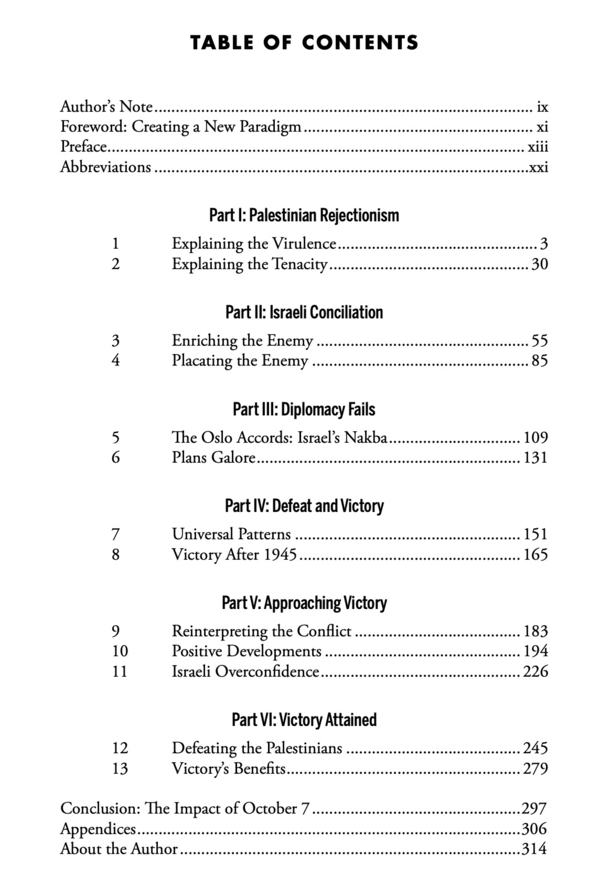| Home | Articles | Blog | Reviews | Spoken | Books | Biographical | Middle East Forum | About this site | Mailing List |
Israel Victory
How Zionists Win Acceptance and Palestinians Get Liberated
by Daniel Pipes
New York: Wicked Son, 2024.
Available in hardback, paperback, and Kindle at Amazon.
 For a larger version of the cover, click here. |
Reviews and Recommendations
"A compelling book which will ignite in the reader a process of reflection and reevaluation, and will serve as a catalyst for renewed conversations about the conflict." — Danny Danon, ambassador of Israel to the United Nations.
"Should sanity ever return to the corridors of power, Israel Victory will be required reading for both the IDF and the State Department." — Robert Spencer, author, The Palestinian Delusion: The Catastrophic History of the Middle East Peace Process.
"Pipes briefly and ably traces the history of the collision between Israeli optimism and Muslim hatred." — Daniel Greenfield, FrontPageMag.
"I certainly hope that leaders everywhere read this volume." — Phyllis Chesler, American Spectator.
"Since Oct. 7, the word heard most from the lips of Israel's highest political and military echelons is "victory." ... While this might seem obvious during a time of war, the term has been unfashionable in the West for three generations and nearly absent in Israel for 30 years. ... Its return to Israeli parlance might well be largely down to Pipes. ... Pipes, as he often has, is taking the road less traveled and is challenging Israelis from the outside to reconsider our conceptions about the conflict and make some hard choices. ... Israel Victory is a must-read for all those who care about Israel's future or aspire to a more peaceful region." — Ashley Perry, Jerusalem Post.
Israel Victory is a "provocative and important new book ... what emerges from Israel Victory with a clarity that is either bracing or dismaying, depending on one's point of view – is that the other, prevailing ways of ending the Israeli-Palestinian conflict have failed." — Michael Mandelbaum, Jerusalem Strategic Tribune.
"An important new book." — Jonathan Tobin, Jewish News Service.
"Israel Victory makes a convincing case. ... To his credit, Pipes avoids the wishful thinking that has long plagued analysis of the region in general, and the Israeli-Palestinian conflict in particular. This is not a book for those who have subsisted on a steady diet of delusions. This is the Middle East as it is, not as starry-eyed academics and misbegotten idealists want it to be. ... Pipes charts a course for ending a conflict that has become intractable thanks to naïveté and unreciprocated goodwill." — Sean Durns, Washington Free Beacon.
"From a person who recently wrote a book on how Zionism can win in the world, we do not expect either a balanced analysis or an argument based on fact, but Mr. Pipes has a point." — Hakki Ôcal, Daily Sabah (perhaps Türkiye's most pro-Erdoğan newspaper).
"Regarded as one of the world's foremost experts on the Muslim world and radical Islam, Pipes has promoted his vision of 'Israel victory' since the late 1990s. ... Pipes appears to be preaching to the choir in today's Israel. The scholar, however, is far from being ideologically aligned with the contemporary Israeli right and the global pro-Israel camp." — Gianluca Pachhiani, Times of Israel.
"Israel Victory is a no-holds-barred, clear-sighted analysis of the historic predicament facing Israel, which leads, inexorably, to what seems an obvious conclusion – the action that Israel must take to resolve the dilemma. Crystal clear in its reasoning and conclusion, this is a book demanding to be read by anyone concerned about Israel and its future." — Neville Teller, Jerusalem Report. (Also available here.)
"A bold and thought-provoking analysis of one of the most enduring conflicts in modern history. ... Pipes' writing is both accessible and incisive, making complex geopolitical strategies understandable to a broad audience. He supports his argument with historical examples and strategic analysis, drawing from a deep well of knowledge about Middle Eastern politics. ... Israel Victory is not just a book about military or political strategy; it's a psychological and philosophical exploration of what peace might look like. ... a compelling read." Grok.
"A timely book, one that should be required reading for all those stunned by October 7, who suddenly realized that the Palestinians were not 'freedom fighters' demanding their human rights and dignity. Pipes is immune to these kind of post-colonial narratives; he keeps his eye on the historical ball. ... We cannot ... turn away from the challenge posed by Daniel Pipes. His strategic goal must be accomplished if there is to be a peaceful outcome to this in which both Muslims and infidels live in dignity and freedom." — Richard Landes, Middle East Quarterly.
Israel Victory "is a compelling work that delves into the complexities of the Palestinian-Israeli conflict, offering a groundbreaking perspective on achieving a lasting resolution." — Modern Diplomacy.
"Israel Victory brings surprisingly fresh insights and original policy recommendations to a well-worn topic." — WorldAuthors.org.
"It would be wonderful if every concerned Israeli and everyone who is even thinking about running for the Knesset would read and contemplate Israel Victory and would insist on Israel becoming more proactive in finally defeating the Arabs in their hundred-year war against Israel and the Jews of the Middle East. Pipes is very convincing that victory for Israel is the path to a lasting peace." — Michael Krampner, Israel National News.
Israel Victory "delivers a profound and piercing reality check: Israel has not won because it has never pursued outright victory." — Bob Goldberg, FutureOfJewish.com
The Back Cover
A leading historian applies his deep understanding of the Middle East to the Palestinian-Israeli conflict – the most intractable, emotive clash of the past century.
Daniel Pipes argues that this long struggle pits two unique and doomed mentalities that exist outside of normal politics against each other, making it so difficult to comprehend.
One mentality consists of rejectionism, or the Palestinians' negation of Jews, Judaism, Zionism, and Israel. Rejectionism accounts for their enduring goal of genocide, their refusal to take yes for an answer, their unwillingness to seek improved living circumstances, and their determination to defame the Jewish state.
The other mentality consists of conciliation, or the Zionists' attempt to win Palestinian acceptance not by defeating their enemy, but by enriching and placating it. Pipes argues against this anomalous Zionist approach, advocating instead the traditional method of ending a war – through victory: Palestinians give up, Israel wins.
In a brilliant essay that brings surprisingly fresh insights and original policy recommendations to a well-worn topic, Pipes draws lessons from past "peace process" failures, delves into the universal nature of defeat and victory, and offers practical advice on how Israel can win: through minimal violence and maximal messaging.
Both sides need an Israel Victory to break with the static pull of outdated mentalities. For Israel, it means acceptance, especially among Muslims and on the global Left. For the Palestinians, Israel Victory means liberation from a destructive obsession, enabling them finally to build a polity, economy, society, and culture worthy of their skills and ambitions.
Biography
Daniel Pipes taught history at Harvard University and the University of Chicago, served on the State Department's Policy Planning Staff under President Reagan, administered Fulbright Fellowships, and founded the Middle East Forum. Israel Victory is his nineteenth book. Prior books of note include In the Path of God, Greater Syria, and The Rushdie Affair.
A top Al-Qaeda figure publicly invited him to convert to Islam. Pipes has also been recognized as one of Harvard University's 100 most influential living graduates and listed in Marquis' Who's Who in the World.
The New York Times calls him "smart and well-informed," the Wall Street Journal, "an authoritative commentator," and the Washington Post, "perhaps the most prominent U.S. scholar on radical Islam." Egypt's Al-Ahram deems him the neo-conservative movement's "leading thinker" and the Toronto Star labels him "wildly controversial." Le Monde Diplomatique considers him "one of the most unconditionally pro-Israel propagandists," and, finally, Counterpunch denounces him as "an infamous charlatan."
Table of Contents:

Further
Asked about the changes prompted by the events of Oct. 7, Daniel Pipes explains:
In the month following Oct. 7, I was confused: all of Israel was talking about victory, so who needed 300 pages of argument making this very point? About a month later, a reversion to old patterns became evident and I published about this on Nov. 17. The next 1½ months had me doing two main things: collecting on that reversion (which became the book's conclusion) and rewriting parts that new circumstances required; for example, the idea of destroying Hamas had seemed radical and remote, now it was underway and practical.
For more reactions to Israel Victory, click here.
Latest Articles
All materials by Daniel Pipes on this site: © 1968-2026 Daniel Pipes. daniel.pipes@gmail.com and @DanielPipes
Support Daniel Pipes' work with a tax-deductible donation to the Middle East Forum.Daniel J. Pipes
(The MEF is a publicly supported, nonprofit organization under section 501(c)3 of the Internal Revenue Code.
Contributions are tax deductible to the full extent allowed by law. Tax-ID 23-774-9796, approved Apr. 27, 1998.
For more information, view our IRS letter of determination.)